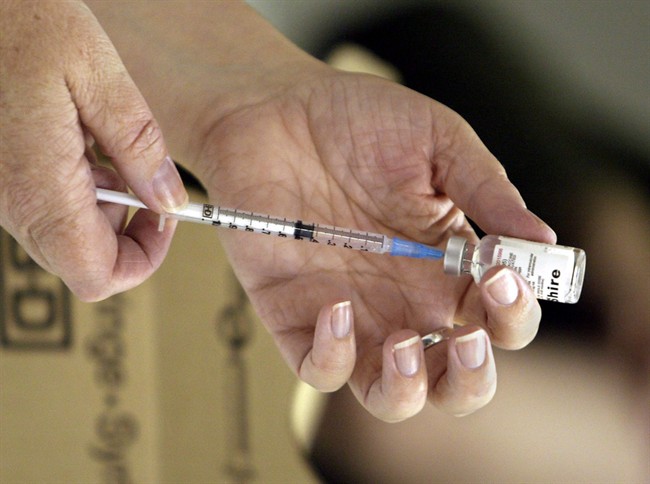TORONTO – The company that makes about half of Canada’s seasonal flu vaccine order and has the country’s pandemic flu vaccine contract has been issued a warning from the U.S. Food and Drug Administration over problems with bacterial contamination in its Quebec manufacturing facility.

Health Canada completed its own previously scheduled inspection of the ID Biomedical plant last Friday and is in the process of writing a report on the Ste. Foy, Que., facility, the department said Tuesday.
“Health Canada is aware of the issues identified by the U.S. FDA and is working closely with both ID Biomedical (GSK) and the U.S. FDA to address these concerns. The U.S. FDA findings, along with Health Canada’s own inspection findings, will be assessed to determine if any compliance actions are required,” Health Canada said in an emailed response to questions.
The plant was acquired in 2005 by GSK (formerly GlaxoSmithKline). Because it owns the only flu vaccine production facility in Canada, GSK has the country’s long-term pandemic flu vaccine contract.
Though pandemic flu vaccine contracts are now reasonably common, Canada was the first country to sign one, in 2001. Because of concerns that scarce supplies of vaccine might not be allowed to cross borders in the event of a severe pandemic, Canada has favoured domestic supply in its pandemic contracts. The most recent 10-year contract, signed in 2011, is worth $425.9 million and requires GSK to supply at least 15 million doses a month in a pandemic once its vaccine is ready.
GSK had little to say Tuesday about its regulatory problems.
“We are making progress to address the concerns raised by the FDA and we are committed to working with them to fully resolve all outstanding issues. We are currently preparing a response to the FDA letter,” it said in an email from Michelle Smolenaars Hunter, communications manager for GSK Canada.

Get breaking National news
But an industry insider who asked not to be named said a warning letter makes manufacturers extremely nervous. Embedded in the letter is the threat that the plant’s licence to supply flu vaccine to the U.S. market could be suspended or revoked if the problems are not resolved to the FDA’s satisfaction.
“You should take prompt action to correct these deviations. Failure to promptly correct these deviations may result in regulatory action without further notice. Such actions may include license suspension and-or revocation,” it said.
The letter, dated June 12, laid out a number of concerns related to bacterial contamination problems at the Ste. Foy plant. The problems were identified during an FDA inspection from March 31 to April 9, but the letter suggested they have been ongoing and may date back to 2011.
It raised concerns about the purified water system at the plant and gave the company 15 working days in which to address the problems. If problems cannot be fixed within that time frame, the company must write to explain the delay.
The agency also asked for a meeting with senior management of both GSK and the Quebec facility to discuss the identified problems and the proposed solutions.
The U.S. regulatory agency noted that since 2011 a total of 60 lots of vaccine from the plant have been rejected due to endotoxin levels that are over a pre-specified limit. Endotoxins are created by bacteria.
A former Health Canada employee who worked in vaccine regulation said endotoxins are omnipresent and some levels are unavoidable. But he suggested levels should be very low. The FDA’s warning letter said endotoxin levels in vaccine from the plant have been “atypical” since May 2011.
“If you see endotoxin levels go up, it usually means that there is some contamination some place in the system — which does not necessarily get into the final product. But they’re even seeing it getting into the final product in some instances,” he said.
The former bureaucrat noted, though, that each lot of vaccine is tested before it is shipped from the production facility. If a lot exceeds established maximum endotoxin levels it is not released. As such, he said, the public’s health would not have been endangered by the plant’s problems.
Still, he suggested the fact the problems seem to have persisted for some time is worrisome.
“Lots can become contaminated. But you shouldn’t be seeing it on an ongoing basis. The real concern here is that they’re seeing it on an ongoing basis.”
GSK is currently in the process of making vaccine for the 2014-15 flu season at the plant.
It is not currently clear how significant the plant’s problems are or how complicated they will be to fix.
But Health Canada appeared to acknowledge supply contingencies may be needed. It said in an email that Canada has flu vaccine purchasing contracts with a number of other suppliers and can source additional vaccine from them if the need arises.
There are currently eight flu vaccines licensed for use in Canada, with only one — Fluviral — produced at the Ste. Foy plant.









Comments
Want to discuss? Please read our Commenting Policy first.